Termite Control Solution




Ask us about our complete termite solution packages. We provide complete termite control services for homes and commercial properties, including termite inspection, termite prevention, and termite control Sydney-wide.
Termite infestation is a serious problem because it can cause serious damage to your property. Good thing we can help you prevent termite infestation and provide safe and eco-friendly termite pest control anywhere in Sydney. We follow Australian industry standards when it comes to termite control.
Our pest exterminators are available to answer any pest-related questions. Please send us an enquiry or talk to us through chat. Chat now or call (02) 8007 4666 and get a free pest control quote.
Tell us your pest problem
FREE QUOTE
Termite Pest Control Solution - #1 Trusted Sydney Pest Control Company
Treating your home usually takes no more than one day. Masters Pest Control Sydney’s professional termite and pest control managers will dig a trench around the foundations of your house. The trench is then filled with an insecticide that acts as a repellent, and the soil is returned to the trench. Ask about our termite control methods.
Find out why it's important to hire professional termite exterminators by watching the video below.
Our Termite Removal Guarantee
Here at Masters Pest Control Sydney, we know how busy you can get, and the last thing that you want to hear is that your building or your business is disrupted because of a pest infestation. We know that lost productivity is lost money, so we take our every job with utmost care.
Cost-effective termite control solution.
We offer competitive rates and guarantee the best value for your money. Read more about our price match guarantee & service warranty.
You can sleep calmly knowing that your home or your business is safe and sound from pests when you work with a professional termites pest controller in Sydney. Over the years of working as pest managers, we have developed unique and effective pest management procedures to provide safe and superior results.
We provide cost-effective termite solutions.
Your time is money, and you can lose both if you do not take extra care when it comes to pests. The best way to do that is to hire professional termites pest control service when you see the first traces of pest infestation.
We provide eco-friendly pest control treatments.
If you still struggle with pest issues or want a complete pest solution that protects your commercial properties from harmful effects.
Termites eat up your furniture, damage the structure of your home, and spread very quickly. This is why termite control is something that needs to be taken very seriously.
Termite infestations are common in Sydney, so you need to be very careful. However, termites aren't just annoying wood-eating critters. Did you know that they can bring down the price of your home as well? That's right, the home, which is an asset that you can sell off in the future, is losing value because of termites.
What Would You Do?
The right step to take is to call a professional termite & pest control service. Since pest extinguishers have the knowledge and equipment to take care of the problem, they are reliable and will take care of the problem quickly and timely.
Secondly, since certain termites use defence mechanisms and release venom, the average homeowner does not stand a chance. Pest control services know which type of termite they are dealing with and bring tools accordingly.
Masters Control Sydney uses effective tools and products to remove spiders without any problems. In addition, the products by their specialists for treatments are child and pet-friendly.
Termidor: The Best Pest Control Termite Solution
The major reason why Termidor is the better termite and pest control solution is its unique "Transfer Effect". Termites are very social insects living in large colonies. They watch out for one another and feed together. They are also in constant contact as they search for food. Termidor takes this behaviour as an advantage. When a termite comes in contact with Termidor, it will transfer it back to the colony on its body and infect termites that have not even been in direct contact with the zone that was treated with Termidor. This "Transfer Effect" is the key reason why no other product performs better than Termidor. Chat now to get a FREE CONSULTATION!
The Advantage of Using Termidor
Some older products are used as repellents to keep away termites rather than kill them. The problem with this approach is that the barriers need to be 100 per cent complete and without any holes in them. This is almost impossible to achieve as termites will search for these gaps as long as they find one.
The good thing is that Termidor is not a repellent, and termites cannot detect it. They will not avoid it and will continue to walk over the treated area and pick up a lethal dose.
You might be offered alternative treatments such as various baiting systems. These systems attract termites to bait stations before being fed bait. This can take months, and during that time, termites will still attack your home. Termidor pest control treatment protects against various types of termites that will last for years. Termidor is the number one brand for termite control in Australia!
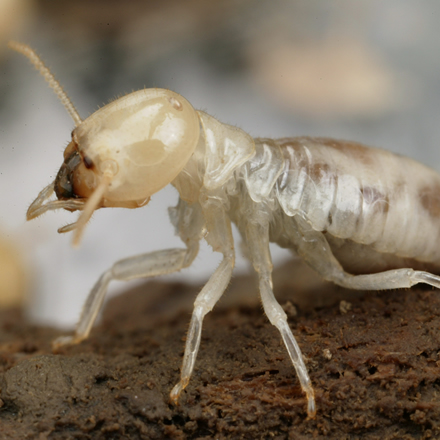

A termite up-close, attacking the structure of a house
Alternative Termite Treatments
You might be offered some cheap alternatives instead of Termidor. The common saying is that it is the same thing but only cheaper. This is not true! Termidor is made of several different and carefully selected ingredients that ensure a product of the highest quality. These ingredients have a large impact on performance. The manufacturer of Termidor, BASF, hired an independent NATA accredited laboratory to test cheap alternatives to Termidor.
The results obtained by these alternatives are shocking. 6 out of 8 total chemical properties have proven to be inferior to Termidor. From these 6, half were over 5 times inferior, and one of these properties was an ability to penetrate the soil.
This means that cheaper alternatives leave gaps in the soil, which act as a free passage for termites. The cost savings of these alternative products is less than 5 per cent of the total cost of termite treatment. If you consider the total cost of your home and all associated risks, it is not worth the risk. Termidor has a track record of over 200,000 satisfied users in a 10 year period. Termidor has been used in over 4 million buildings in the US. Always remember, there is only one Termidor.
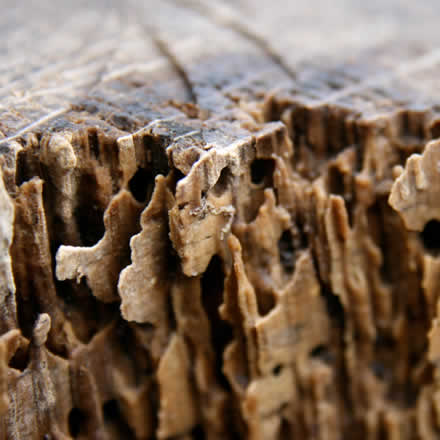

Termites Termidor Solution
Things You Need to Know About Termite Control
Treating your home with Termidor usually takes no more than one day. First, licensed pest controllers will dig a trench around the foundations of your house. The trench is then filled with Termidor, and the soil is returned to the trench.
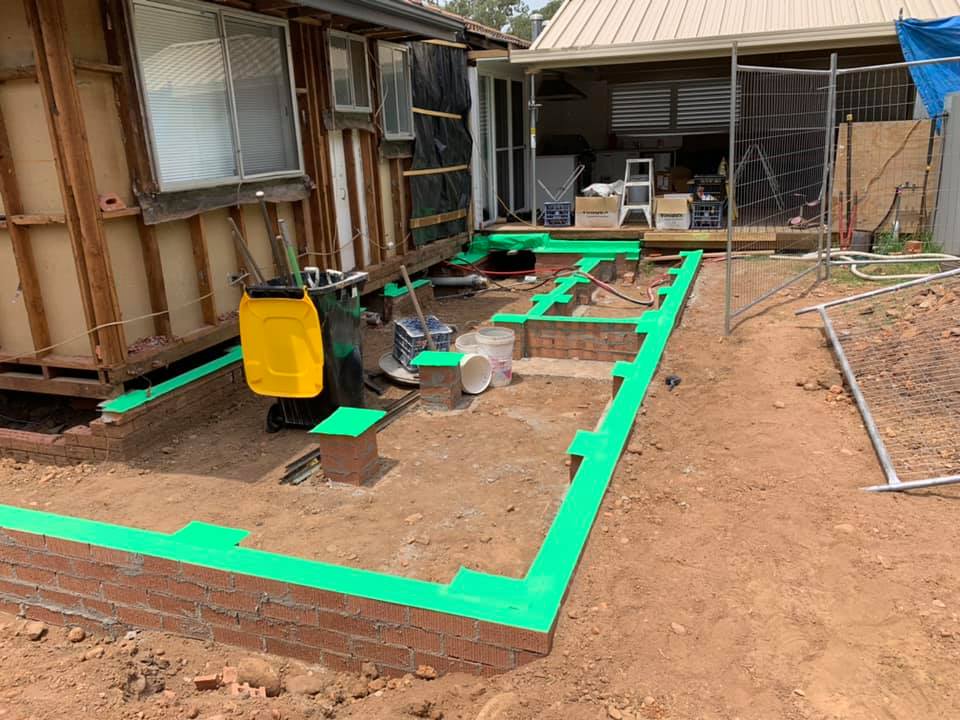

Using Termidor around the house.
Holes are drilled in slabs and paths while the concrete is cut away so the ground beneath can be treated. Heavy soils such as clay soil must be removed and replaced before doing any treatment. Every termite treatment will require a follow-up visit. Plumbers and electricians can open the access for termites when they do their work underground. Tree roots can also make access to termites as they grow throughout the ground. We recommend that a thorough termite inspection should be carried out each year.
When it comes to homeowners' insurance, and more specifically, the types of damage covered within this insurance, there is generally a lot of room for claims to be filed. This is because many damage types are covered by insurance, including fire damage and accidental breakage.
However, termite damage, or damage caused inadvertently due to termite activity, is generally not covered, as a rule. This is a major cause for concern in many of the older homes on the market, as they are often in desperate need of termite control in Sydney.
Potential Damage Caused by Termites
Termites are, by nature, very voracious. They generally damage surfaces that are thought to be strong and almost everlasting, reducing them to rubble over the years. Sometimes, even in a few months, depending on the severity of the infestation. In addition to that, termites can cause fixtures and old fittings such as windows and crawl-space bottoms to cave in and collapse. This is very damaging to old houses, or houses which have comparatively older construction.
Typically, termites will:
-
Eat away at any furniture or fittings left as they are and not cleaned or maintained for an extended period of time.
-
They will burrow into the wood and weaken it from within, which is very dangerous if there are wooden fixtures in the ceiling and even more dangerous if the ceiling of the lower floors is infested with termites.
-
Termites are most common in houses with mostly wooden furniture and wood fittings in the walls. These fittings could be electrical outlets, brackets, tables that are fitted into walls and cabinets. The first two could be a fire hazard since termites turn the wood into a powder, which is very prone to catching fire.
Termite Damage & Insurance
The situation is made all the worse by the fact that insurance doesn't really cover termites. In many parts, the damage is referred to as Wood-Destroying Insect Damage. While some companies offer insurance coverage for it, and this coverage is very exclusive, the majority of the companies do away with the inclusion of termite damage as a bona fide occurrence.
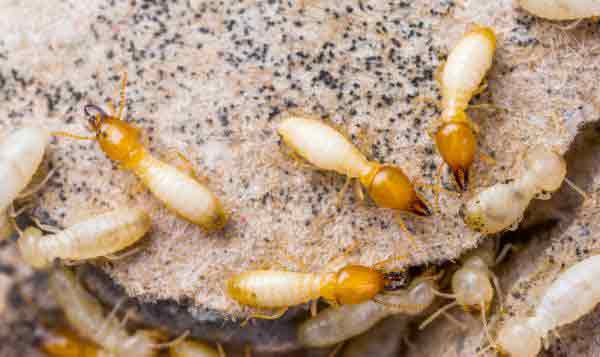

Termite solutions for the home.
This can be very disadvantageous since termite damage can be quite dangerous if left unchecked.
The Reason for Non-Coverage
The majority of the insurance companies do not have a policy specifically for termites because the damage is preventable. This is true to some extent, as homeowners can easily take measures that prevent the start of an infestation and prevent termites from making their homes in the wood. However, there can be several reasons why a homeowner could not prevent the infestation in most cases.
If you are worried about termite infestations and the damage caused by them if you are purchasing a new home, check for an infestation and implement termite control measures from the start instead of waiting for the infestation to grow. In this way, you can not only prevent the termites from ever becoming a problem, but you can also make sure that you never have to purchase a policy that caters specifically to termites, as those can be somewhat expensive. In conclusion, prevention measures are better than termite control measures, and a little investigation at the time of home purchasing can go a long way in preventing termite damage.
Types of termite traps
Non-chemical Termite Treatments
Here are some ways to trap termites without using chemicals:
- The best way to trap termites is by installing a physical termite barrier. This is usually done during pre-construction.
- Termite traps may also involve using sands as well as steel mesh that acts as a physical barrier.
- Another kind of termite trap involves biological control agents such as fungi and nematodes.
Chemical Treatments
Another common way of getting rid of termites is by using pesticides. Here are common chemicals used to eradicate termites:
- Liquid soil-applied termiticides
- Building materials impregnated with termiticides
- Wood treatments
- Termite baits
Termite barrier treatment Types
One of the most common methods of eradicating termites is the use of soil-applied barrier treatment. Therefore, termiticides, which are used for barrier treatments, should specifically be labelled for that use.
However, these treatments can turn into a contaminant for your house and the surrounding drinking water well if not used properly. This is why it is recommended to hire professional pest exterminators trained and licensed to handle termiticides.
What chemicals are used to create termiticides?
Acetamiprid, Chlorantraniliprole, Bifenthrin, Chlorfenapyr, Cypermethrin, Cyfluthrin, Imidacloprid, Esfenvalerate, Permethrin and Fipronil.
Types of termite baits?
Diflubenzuron inhibits the developmental stages of insects. Hexaflumuron is usually used in the monitoring, inspection, and identification of termites. Hydramethylnon is used to remove roaches, ants, crickets, as well as termites. Noviflumuron is used for the disruption of termite growth and activity. Lufenuron is an insect growth regulator, which is used for controlling fleas and termites.
Termites Protection for Commercial Properties or Businesses in Sydney
Commercial properties or small business owners need to get termite pest control inspections to protect their businesses regularly. Having a pest problem is extremely detrimental to a business.
Termites will eat anything that is made of wood and can even damage electrical wiring and plaster walls. When they start gnawing on plastic and electrical wiring, this typically means that the infestation has become widespread and significant damage has been done. Even structures with steel frames are not immune to termites as they can still enter and destroy the wooden roof, furniture and everything else made of wood.
Do you suspect a termite infestation?
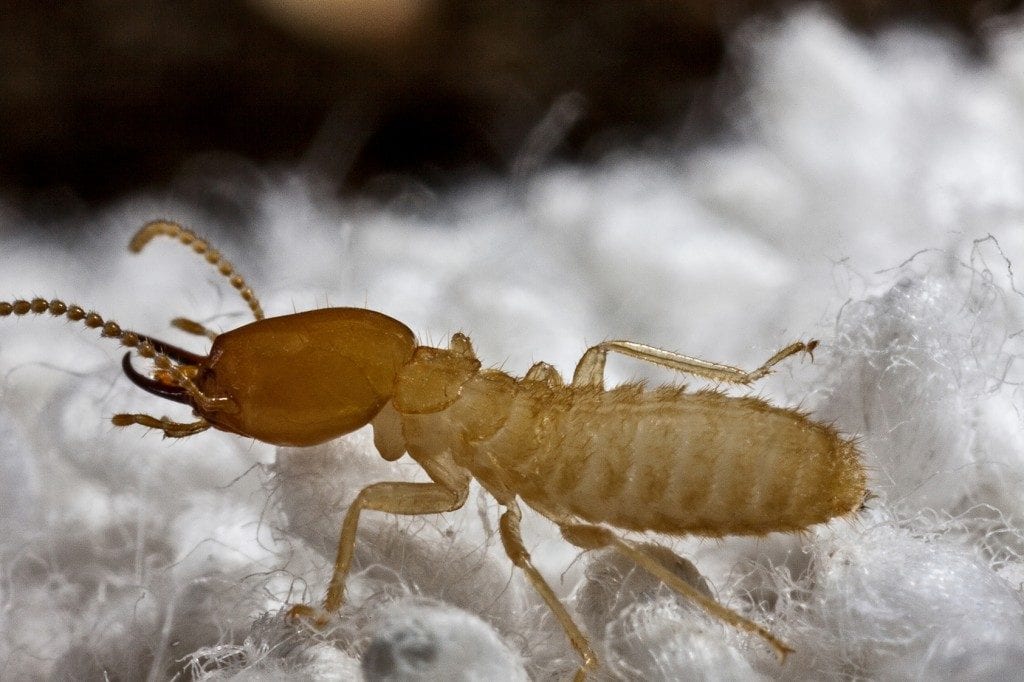

We can help you trap termites and stop the infestation. Call (02) 8007 4666.
When it comes to saving your property from termites, the first step you need to take is to be alert. Since they rarely come out from mud tubes, soil, or any food source they are tunnelling through, many people can easily miss a termite problem.
Only when these pests come swarming out or have caused sufficient damage to a structure before they become noticeable.
Here are a few ways to spot a termite infestation:
- First, look for hollow spots in wooden structures. This can be done with a flathead screwdriver.
- Distinguish between ant swarms and termite swarms. Ant's front wings are longer than their hind wings, while termite wings are of the same length. In addition, unlike ants whose antennae are bent at 90 degrees, termite antennae are straight to the point of drooping.
Other Signs of a Termite Problem
Wall paint is breaking.
Bubbled or cracked paint may be an indication of a pest problem. The more termites feed off your walls, the nearer they get to the surface. This causes the paint to bubble up or crack. If the wall is breaking in a way that is not in proportion to the foundation, then that’s a red flag.
Damaged wood
Tap wooden structured to check if they've become hollow. You will be surprised at the power of small white ants in burrowing and feeding off the wood. So be on the lookout and immediately do something about this when you see damages to wooden structures.
Mud tubes
These are small cave-like structures along the wall. These are usually brown and look like mini tunnels.
How to stop termites
Don’t prematurely disturb the termites.
Make sure to keep anyone from tapping their nest or disrupting the termite activities. If you disturb termites, they will move deeper underground, making it more difficult to stop the termite infestation.
Find the nest.
The most effective way of eliminating white ants is to find the nest where the queen is located. When you find the nest, then that’s where you want to start your treatment. First, use a dedicated white ant solution to exterminate the termites and then apply more to surrounding areas.
Use a chemical termite solution.
There are many chemical solutions you can use. The solution may be sprayed onto the soil and around your house's structure or foundation. These are pretty toxic chemicals, so you should be careful when using them.
(SEE: What is organic pest control?)
Install physical termite barriers.
What are physical termite barriers? Consult a pest control professional and find out how you can install termite barriers. These physical barriers are usually installed during the pre-construction of a house.
Use termite baiting.
This is another popular white ant treatment. How baiting works is simple: the goal is to scatter baits all over the property and encourage termites to bring them to their colony. This is a good method because it eliminates the source of the problem. It is also a passive way of getting rid of termites and requires less effort on your part.
General Termite Information
Termites will eat anything that is made of wood and can even damage electrical wiring and plaster walls. When this happens, it means that they are all over your place, and they already did significant damage to your home. Even houses with steel frames are not immune to termites as they can still enter and destroy the wooden roof, furniture and everything else made of wood.
To make it simple, termites come to your house in search of food. They can come from their nest, which can be over a hundred metres far. They travel through their underground tunnels and can squeeze through cracks to enter your house.
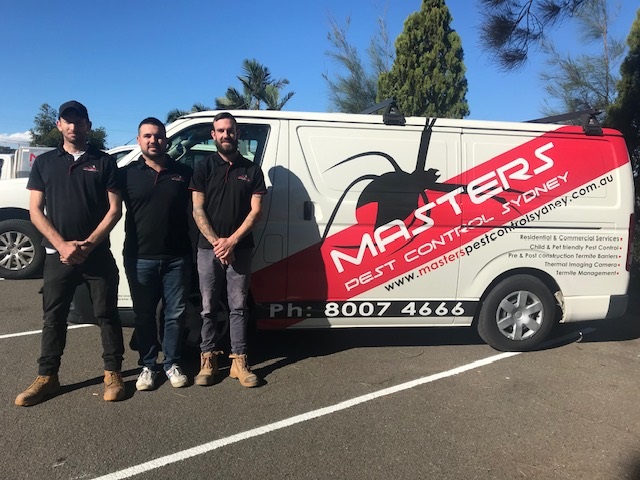

Friendly Residential Pest Control Sydney Team
Termite Infestation in Residential Properties
Termite infestations can compromise the structural stability and cause thousands of dollars in damage without anyone even knowing. It’s recommended that you have your house get a thorough termite inspection by a licensed termite control professional every one to three years to keep the property safe from termites. However, there are subtle signs of termites. These are some red flags
signalling termites that homeowners can keep an eye out for regularly. To help keep the damage to a minimum, it’s crucial to catch the warning signs as soon as possible.
Inspect for termite activity
You will need a good flashlight, screwdriver or pocket knife, and coveralls. Look at possible trouble spots closely. Often this means crawling in crawl spaces. The presence of swarmers or their shed wings almost always indicates termite activity. A complete DIY termite inspection would mean locating exposed shelter tubes and damaged wood. Termite damage may be located by probing wood with a screwdriver, ice pick, or knife. A termite inspection should be concerned with the exterior and interior surfaces of the foundation, particularly construction where wood is on or near the soil. Start termite inspection in the basement and use a bright flashlight. Look for mud tubes and the activity of swarmers.
You'll see swarmers or discarded wings if there's a termite infestation in your home.
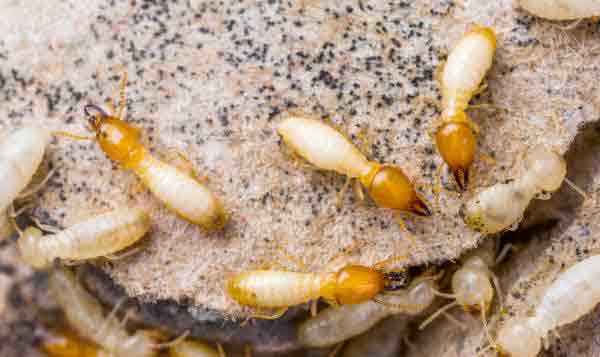

Signs of Termites In Your Home
Swarmers, also known as reproductives, are young female and male winged termites. They leave their nest to establish a new colony. Swarming occurs when a colony reaches a certain size. In the springtime, after the last freeze, termite swarmers will emerge from their nest to mate and search for a new location to start a colony, which typically includes our homes. As such, termite swarmers, or their discarded wings near window sills and doors, are often the first (and only outwardly visible) sign of a termite problem.
Most swarmers emerge during the day, most frequently on warm days after
the rain. Swarmers found outdoors near tree stumps, railroad ties, etc., are
not an indication that your house is infested but are present on the outside
only. On the other hand, finding swarmers indoors often means that you have a
termite infestation within your house. “Flying ants,” especially near light
sources, indicate that a nest may be nearby.
Subterranean termites create mud tubes.
Subterranean termites are the most destructive termite species. They
maintain their headquarters in the ground and build mud tubes that are
pencil-size to connect the nest (moisture) to the food source (wood). Mud tubes
are most often found near the home’s foundation. Termites may excavate the wood so that only a fragile layer of wood is left on the surface of the cavity and the outside. This layer is broken, and they will cover the holes with mud-like material used to make the tubes. This is a mixture of soil, feces, and saliva.
Mud tubes or shelter tubes are proof of termite infestation, but their absence does not necessarily mean that a structure is free of termites. The insects may reach sills and other wood members through cracks or voids in the foundation wall or from earth-filled porches, steps, terraces, or patios. You can break open tubes to determine if termites are still active inside. Termites often rebuild damaged tubes - another indication of continued activity. Old tubes are dry and will crumble easily.
You'll see signs of wood damage and/or bubbling paint.
Termites tend to eat wood from the inside out, so wood that sounds
hollow when tapped often signifies a termite infestation. Termite damaged wood
resonates with a dull thud (hollow sound) when tapped with a hammer. Pick and
probe the surface of an infested piece of wood with a penknife, and you will
find tunnels running parallel to the wood's grain.
It would help if you also look for blistering pieces of wood. Wood may appear
crushed at structural bearing points. Uneven or bubbling paint and tiny holes on the wood are also often a sign of moisture build-up, which could mean one of two things - water damage or, then again, termites. Finding these signs in a structure does not mean you have an immediate emergency because, comparatively speaking, the rate at which damage occurs is relatively slow.
You'll see droppings or Drywood termite frass.
As they eat through infested wood, Drywood termites produce wood-coloured droppings that look like sawdust. If you find a small pile of what looks like pellets inside or outside the home, it could be a sign of drywood termite infestation.
Termites Lower the Value of Your Home
There are many scenarios where termites can lower home values. The basic one is that they damage the structural integrity of your home. This is why homeowners take termites so seriously. While you may not see termites, they don't really cause any annoyance to you, they don't bite, and they are hardly visible. However, they do a lot of damage behind the scenes. For example, they may be eating up your walls from the inside, and they also eat up some of the wirings in your home.
Although things may seem perfectly sound on the outside, if you do a proper inspection for termite control, you may find that a lot of them have eaten holes into your walls. They may even make your house a fire hazard by chewing through the electrical wiring. Termites also eat up your furniture and any wood furnishings that are installed in your home.
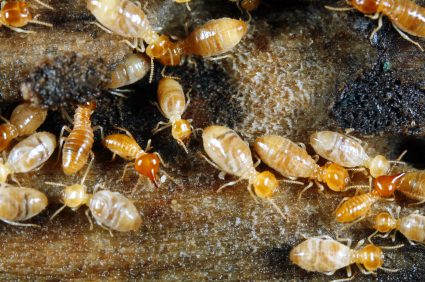

Termites lowering the home values.
Thus, whenever you buy a home, you need an inspection. This is also why termite control is so important if you already own a home because if you ever plan to sell it, the person buying it will get it tested for termites. A termite infestation can knock down thousands of dollars from your property value. You may make a great deal to sell your home at a great price only for the inspection to drive the customer away or lower the price.
Additionally, if you are buying a house, then you need to schedule an inspection. If termites are found on the property, you should then lower your offer.
The reason for this price drop is straightforward. First, the person who moves into the house will need to get termite control measures implemented. Along with that, they will also need to repair all the things that the termite have damaged. If the termite infestation has been going on for a long time, this might amount to much damage. In some cases, buyers may decide to knock down the house and build a new one on the plot after fumigation. That's how damaging termite infestations can truly be to residential structures.
Keep your Home Safe from Termites
Don't worry though, keeping your home safe from termites is not that hard. All you need is vigilance. Buy termite control products and use them whenever needed. It would help if you also got termite inspections done on your home after every few months. They don't cost a lot, and the money they end up saving you, in the long run, makes it all worth it.
You should also have an inspection done if any other house in your neighbourhood gets infested with termites and these insects travel to nearby places very easily.
Just remember to not use the professional level termite killing products by yourself. Some of them require you to wear proper personal protection gear during use and can have harmful effects if misused. Instead, it's much better to call a pest control services team and let them handle it.
